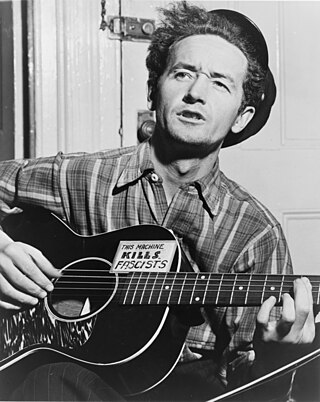
Woodrow Wilson Guthrie was an American singer-songwriter and composer who was one of the most significant figures in American folk music. His work focused on themes of American socialism and anti-fascism. He inspired several generations both politically and musically with songs such as "This Land Is Your Land".

Hampden is a town in Hampden County, Massachusetts, United States. The population was 4,966 at the 2020 census. It is part of the Springfield, Massachusetts Metropolitan Statistical Area. The namesake of Hampden is John Hampden, an English patriot.

Wilbraham is a town in Hampden County, Massachusetts, United States. It is a suburb of the City of Springfield, and part of the Springfield Metropolitan Statistical Area. The population was 14,613 at the 2020 census.

"Roll On, Columbia, Roll On" is an American folk song written in 1941 by American folk singer Woody Guthrie, who popularized the song through his own recording of it. The song glamorized the harnessing of the Columbia River in the Pacific Northwest. The 11 hydroelectric dams built on the American stretch of the Columbia helped farms and industry, but their construction also permanently altered the character of the river.

"Goodnight, Irene" or "Irene, Goodnight," is a 20th-century American folk standard, written in 3
4 time, first recorded by American blues musician Huddie 'Lead Belly' Ledbetter in 1933. A version recorded by the Weavers was a #1 hit in 1950.
"Streets of Laredo", also known as "The Dying Cowboy", is a famous American cowboy ballad in which a dying ranger tells his story to another cowboy. Members of the Western Writers of America chose it as one of the Top 100 Western songs of all time.

Paul Clayton was an American folksinger and folklorist who was prominent in the folk music revival of the 1950s and 1960s.

Dust Bowl Ballads is an album by American folk singer Woody Guthrie. It was released by Victor Records, in 1940. All the songs on the album deal with the Dust Bowl and its effects on the country and its people. It is considered to be one of the first concept albums. It was Guthrie's first commercial recording and the most successful album of his career.

"Fair Margaret and Sweet William" is a traditional English ballad which tells of two lovers, one or both of whom die from heartbreak. Thomas Percy included it in his 1765 Reliques and said that it was quoted as early as 1611 in the Knight of the Burning Pestle. In the United States, variations of Fair Margaret were regarded as folk song as early as 1823.

Helen Hartness Flanders, a native of the U.S. state of Vermont, was an internationally recognized ballad collector and an authority on the folk music found in New England and the British Isles. At the initiative of the Vermont Commission on Country Life, Flanders commenced a three-decade career capturing traditional songs that were sung in New England—songs that, in many cases, traced their origin to the British Isles. The timing of her life work was critical, coming as it did when people were turning away from traditional music in favor of listening to the radio. Today her nearly 4,500 field recordings, transcriptions and analyses are housed at the Flanders Ballad Collection at Middlebury College, Middlebury, Vermont and have been a resource for scholars and folk singers since the establishment of the collection in 1941.
"Rattlesnake Mountain" is a traditional American folk song derived from one of the earliest known American ballads, "On Springfield Mountain". It is based on the events surrounding the death by snakebite of Timothy Merrick on August 7, 1761.
"On the Trail of the Buffalo", also known as "The Buffalo Skinners" or "The Hills of Mexico", is a traditional American folk song in the western music genre. It tells the story of an 1873 buffalo hunt on the southern plains. According to Fannie Eckstorm, 1873 is correct, as the year that professional buffalo hunters from Dodge City first entered the northern part of the Texas panhandle. It is thought to be based on the song Canaday-I-O.

"The Cuckoo" is a traditional English folk song, also sung in the United States, Canada, Scotland and Ireland. The song is known by many names, including "The Coo-Coo", "The Coo-Coo Bird", "The Cuckoo Bird", "The Cuckoo Is a Pretty Bird", "The Evening Meeting", "The Unconstant Lover", "Bunclody" and "Going to Georgia". In the United States, the song is sometimes syncretized with the other traditional folk song "Jack of Diamonds". Lyrics usually include the line : "The cuckoo is a pretty bird, she sings as she flies; she brings us glad tidings, and she tells us no lies."
"Fair Charlotte" is an American folk ballad.
"Cumberland Gap" is an Appalachian folk song that likely dates to the latter half of the 19th century and was first recorded in 1924. The song is typically played on banjo or fiddle, and well-known versions of the song include instrumental versions as well as versions with lyrics. A version of the song appeared in the 1934 book, American Ballads and Folk Songs, by folk song collector John Lomax. Woody Guthrie recorded a version of the song at his Folkways sessions in the mid-1940s, and the song saw a resurgence in popularity with the rise of bluegrass and the American folk music revival in the 1950s. In 1957, the British musician Lonnie Donegan had a No. 1 UK hit with a skiffle version of "Cumberland Gap".

"Pittsburgh Town", sometimes titled as "Pittsburgh" or "Pittsburgh is a Great Old Town", is a folk song written by Woody Guthrie and originally recorded by Pete Seeger. The song was written during a Pittsburgh, Pennsylvania stop on an Almanac Singers' tour; both Seeger and Guthrie were members of the band at this time. The song speaks of the labor and environmental problems that the city was facing in 1941, when the song was written. In the time since, environmental legislation has reduced the pollution problem that plagued Pittsburgh; because of this, the song's mentions of pollution in Pittsburgh have been sometimes been replaced with verses extolling the city.
Phillips Barry was an American academic and collector of traditional ballads in New England.
The Old Maid's Song is an American folk song. It recounts the story of a woman whose younger sisters have married, while she has remained a spinster into middle age. During the chorus of the song, the narrator defines a loose criterion for a husband.
Logan Eberhardt English was an American folk singer, poet, and playwright. As MC at Gerde's Folk City in Greenwich Village, he was influential in Bob Dylan's early career, and also recorded one of the earliest albums produced as a tribute to Woody Guthrie.
Jeff Place is the American writer and producer, and a curator and senior archivist with the Smithsonian Center for Folklife and Cultural Heritage. He has won three Grammy Awards and six Indie Awards.










